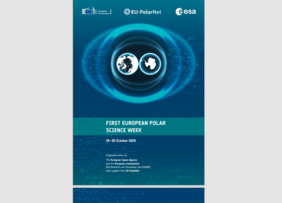The report of the first Polar Science Week (26-30 October) is now online. Please find the preamble and the link to the full report below:
Preamble
During the high-level opening session, John Bell, European Commission Director, Directorate General Research & Innovation, European Commission, and Josef Aschbacher, ESA Director praised the cooperation between the EC and ESA, in the context of the Earth System Science Arrangement. They confirmed their willingness to advance towards a better coordination and integration of EC and ESA activities in Polar research.
The European Union has been funding a significant number of Polar projects as part of the Framework programmes for Research and Innovation. In 2015, the funding of the EU-PolarNet project was instrumental as it enables stakeholders to coordinate activities across Europe. EU-PolarNet has delivered a number of key outputs among which the Integrated European Research Programme (EPRP). This report is the result of a process involving many players identifying key research and knowledge gaps, feeding into European Commission’s policy making. The launch of the new EU-PolarNet 2 project during the conference showed the willingness of the EU to sustain these coordination efforts. EU-PolarNet 2 will play a key role to reinforce the science to policy interface and to increase coordination of polar research activities at European level, with a better understanding of what is done at national level. EU-PolarNet 2 will also lead the coordination of the EU Polar Cluster in close cooperation with the ESA Polar activities.
The EU Polar Cluster, launched in 2016, has been extending in terms of number of projects (21 projects and 2 initiatives) and it confirmed its objective to reinforce cooperation across projects on a number of areas of common interest. Transnational cooperation of all involved actors (researchers and stakeholders) and European-wide coordination of Polar research efforts are decisively important, particularly in tackling major societal challenges such as climate change.
Scientific knowledge has to be appropriately disseminated to inform policymakers with a high level of expertise and to support evidence-based policy making.
The projects from the ESA Polar Cluster confirmed the need to work closer with the EU funded projects. This is fully supported by ESA, which launched a call for tender to facilitate innovative scientific developments through collaborative research and networking opportunities in the Polar research domain and in particular between the ESA and EU Polar Clusters.
For the full report, please see this link: EuropeanPolarScience_WeekReport_210618.pdf (esa.int)
For more information regarding the EU Polar Cluster, please see this link: Home - EU Polar Cluster
For more information on the ESA Polar Science cluster, please see this link: ESA Polar Science Cluster - eo science for society
For more information on the European Polar Science week, please see this link: 2020 European Polar Science Week (esa.int)

